Archive for July 17th, 2009
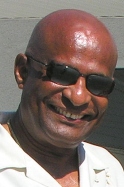
Editor accused of blackmail

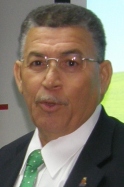 (CNS): Leader of Government Business McKeeva Bush hit out at the Editor in Chief of Cayman Net News, Desmond Seales, on Friday morning, accusing the newspaper boss of trying to blackmail him with an editorial published on 13 July. He said the editorial contained blatant lies and that for too long Seales had been getting away with threatening people who would not give him a blank cheque. He added that if Seales was more objective instead of castigating people he might make money.
(CNS): Leader of Government Business McKeeva Bush hit out at the Editor in Chief of Cayman Net News, Desmond Seales, on Friday morning, accusing the newspaper boss of trying to blackmail him with an editorial published on 13 July. He said the editorial contained blatant lies and that for too long Seales had been getting away with threatening people who would not give him a blank cheque. He added that if Seales was more objective instead of castigating people he might make money.
Speaking at a government press briefing, he said that Seales had approached him with a proposal to undertake the government’s communication and public relations work, but Bush said that the government had asked him to be more specific about his offer as it appeared he was asking for a blank cheque. As a result of the fact that government had not offered him work yet, Bush suggested Seales was using the pages of his newspaper to “castigate” or push government into a corner to force them to use his services.
Bush said the editorial was wrong and his tactic was not going to work. “He needs to be objective and give the country confidence in him then he will make money,” the leader of government business said. “He is not going to brow beat us just because we can’t give him an open check.” Bush said Seales could not threaten anyone by saying he had “plenty ink” as he would not put up with it.
“If the media can’t police themselves then remedies will have to be found. This administration will not be blackmailed by any two-bit hustler who, when you do not pay what he is demanding, messes up the store. This kind of hoodlumism won’t be tolerated,” Bush added. He said that for far too long Seales had gotten away with threatening and brow beating people with his “ink” and he was in the habit of castigating people or loving them when he choose to suit his own ends.
Bush said that he felt that he and the government in general had a good and cordial relationship with the local press and that was what he would expect. “We are fair in answering questions,” he said. “If I can be reached I will talk to the press but we have country to run and there is no fair and honest reason for the attack 13 July.”
He explained that Seales had taken him and the government to task over communication saying that when he, as LoGB, had returned from his overseas travels he had made “impulsive commitments and announcements”, which had not been properly cleared, such as the pensions holiday, and that there was poor communication between ministries. Bush said it was an out and out lie. “I make no statements without being briefed by the relevant ministry,” he said and reminded everyone what he had actually said at the last briefing.
He said there was a need to be fair and tolerant as the media was not on the moon on 20 May and that the press knew full well what problems the new government now faced on the financial front. He noted that the television and radios had to be licensed and were policed that way but that there was nothing policing print media. He said Seales was a wild card, using the type of abuse that he did and it had gone on too long with no one speaking out about it.
He did say he was in favour of the media forming some kind of association through which they would set standards and police themselves as he said this happened in other countries. “For years I have asked for something like this to happen and I hope something will as there needs to besome ethics and some standards.” He noted some were following guidelines while others were just doing what they wanted.
Asked if it was criticism that concerned him or just the way Seales was behaving, he said that the government was not afraid of criticism as it was to be expected. Bush added that by listening to criticism he had learned a lot, especially over the last four years and that was why he was back in office, but he said criticism must be fair and free of bias. “We cannot be blackmailed,” he added.
He said that Seales was trying to imply that the new government did not have a cohesive communication strategy and thought by doing that he would brow beat the government into using his communication firm, but he said the government intended to return to the centralisation of government communications with GIS. He said communication was not going to be pulled apart by evil devices.
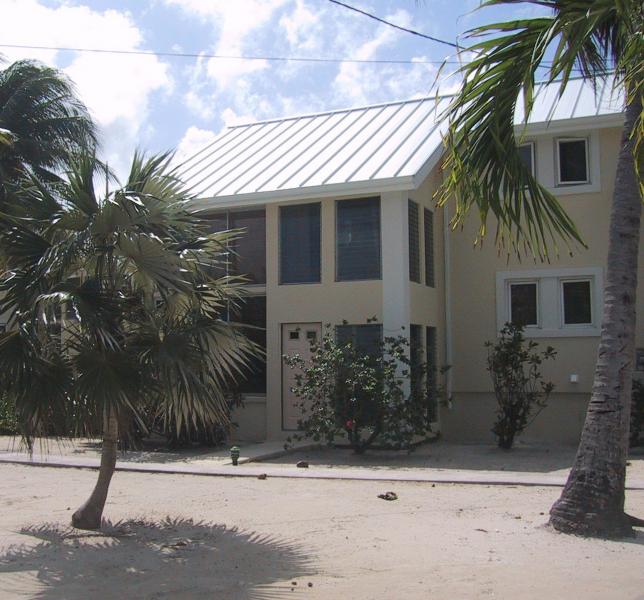
Fire destroys vacation condo in Cayman Kai
 (CNS): In what the fire service says appeared to be an early morning electrical fire, a condo at Island House in Cayman Kai, Rum Point, has been destroyed and a second one damaged. Cayman Islands Fire Service (CIFS) officials received a report from 911 at 11:54 pm on Wednesday, 16 July, and two fire vehicles were dispatched from the Frank Sound Fire Station, arriving at the scene by 12:07am, and a third truck was dispatched from Central Fire Station in George Town. The condos were both empty and no one was hurt during the blaze.
(CNS): In what the fire service says appeared to be an early morning electrical fire, a condo at Island House in Cayman Kai, Rum Point, has been destroyed and a second one damaged. Cayman Islands Fire Service (CIFS) officials received a report from 911 at 11:54 pm on Wednesday, 16 July, and two fire vehicles were dispatched from the Frank Sound Fire Station, arriving at the scene by 12:07am, and a third truck was dispatched from Central Fire Station in George Town. The condos were both empty and no one was hurt during the blaze.
When fire officers reached the scene they found that Unit 10 was engulfed with flames and they worked until the fire appeared to be extinguished by 1:08am, but three hours later, while standing-by at the scene, the fire reignited in the unit’s roof.
Dooly McLaughlin explained that it is not uncommon for a fire to reignite as even when a burning house is saturated there can be a hidden hot spot where the water didn’t penetrate. He said that waswhy fire officers stay on the scene watching even after a fire may appear to have been extinguished. “We often re-visit the scene of a fire several hours later as well to make sure that there are no more hot spots that could reignite,” he added,explaining that despite the water it can take hours and hours for a burned house to cool.
He confirmed that it did appear to be an electrical fire but investigations were on going.
The fire has extensively damaged unit 10 and also caused minor damage to the neighbouring unit 11.
For more information on preventing and detecting residential fires, contact McLaughlin at 244-3914.
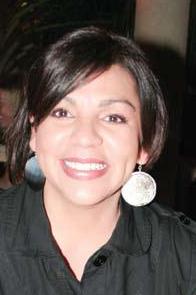
Scott-Roberts murder trial delayed
 (CNS): The trial of Kirkland Henry (27) and Larry Ricketts (25) for the murder of Estella Scott-Roberts (left) in October 2008, which was scheduled to start on 3 August, has been postponed until January 2010. Following several months of problems regarding local representation and legal aid certificates for the two accused men, it was confirmed in Grand Court today (17 July) that Lee Freeman from the law firm of Priestley’s has gone on record as Ricketts’ local counsel and Ben Tonner remains as the local representative for Henry. Both men, who are Jamaican nationals, have also now been granted legal aid for overseas QCs for the trial.
(CNS): The trial of Kirkland Henry (27) and Larry Ricketts (25) for the murder of Estella Scott-Roberts (left) in October 2008, which was scheduled to start on 3 August, has been postponed until January 2010. Following several months of problems regarding local representation and legal aid certificates for the two accused men, it was confirmed in Grand Court today (17 July) that Lee Freeman from the law firm of Priestley’s has gone on record as Ricketts’ local counsel and Ben Tonner remains as the local representative for Henry. Both men, who are Jamaican nationals, have also now been granted legal aid for overseas QCs for the trial.
Over the last few weeks, both Justice Alex Henderson and Justice Leighton Pusey have raised their concerns in court about the problems of finding counsel to represent the two men and in turn securing legal aid certificates. Earlier this week, the court was told that Scott Wilson had expressed an interest in representing Ricketts, who has been without counsel for months, but was unable to act as his firm had stated it was no longer prepared to work on legal aid matters because of the consistent and protracted delay in receiving payment.
However, with counsel now secured for both men and legal aid granted, both Tonner and Freeman will be seeking to instruct overseas QCs as lead counsel. The trial, which is expected to last three weeks, is now set to commence on 26 January 2010.
Ricketts and Henry were arrested on 27 October, some two weeks after the shocking discovery of Scott-Robert’s body in her own burnt out car in the dykes area of Barkers in West Bay.
Both men are charged with robbery, abduction and murder, while Henry is also charged with an additional count of rape.

Arrest made in teen rape case
(CNS): Less than two weeks after the alleged rape of a teenager at a house in the Red Bay area, police say they have arrested a 31-year-old man on suspicion of raping the 16-year-old girl in the early hours of Saturday, 4 July. The mother of the 16 year old victim contacted the police at about 5:50 am shortly after her daughter came home and related the attack to her in which a weapon was believed to have been used. Although police have offered few details on the reported attack, CNS understands that the victim may have been forced to the location where the rape took place.
The RCIPS said officers continue to work with the young lady and her family and counseling has been offered. “Rape is a traumatic experience for both victims and their families and people who commit such crimes are warned that every effort will be made to bring them to justice,” said Detective Sergeant Winsome Prendergast.
Anyone one with information on the incident should contact DS Prendergast on 516 5241.
Anyone with information about crime taking place in the Cayman Islands should contact their local police station or Crime Stoppers on 800-8477 (TIPS). All persons calling Crime Stoppers remain anonymous and are eligible for a reward of up to $1000 should their information lead to an arrest or recovery of property/drugs.
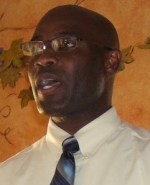
Search on for Unsung Heroes
 (CNS): Monday is the deadline to nominate an Unsung Hero. Sponsor FirstCaribbean is asking the public to help them find this year’s hero by nominating anyone they feel deserves recognition for the selfless work they do. Those nominated must be Caymanian or resident for five years, have a low media profile, be willing to participate in the awards ceremony, above all be dedicated beyond the ordinary towards social improvement. (Left: Elvis Coward, local Unsung Heroes coordinator at FirstCaribbean International Bank.)
(CNS): Monday is the deadline to nominate an Unsung Hero. Sponsor FirstCaribbean is asking the public to help them find this year’s hero by nominating anyone they feel deserves recognition for the selfless work they do. Those nominated must be Caymanian or resident for five years, have a low media profile, be willing to participate in the awards ceremony, above all be dedicated beyond the ordinary towards social improvement. (Left: Elvis Coward, local Unsung Heroes coordinator at FirstCaribbean International Bank.)
Nomination forms are available online www.firstcaribbeanbank.com and at all FirstCaribbean branches. A release from the bank says the nominations deadline has been extended to 20 July.
FirstCaribbean has been a sponsor of the Unsung Heroes program every year since 2003. The aim of the award is to recognise the people in the community who give us pride in the present, hope for the future, and most importantly, they are living examples of the best each of us can be.
Each year FirstCaribbean takes part both locally and regionally in the Unsung Heroes program and representatives from each country receive a local prize and nomination for the regional prize. The nominees are people who selflessly dedicate their lives to making a difference for others, ‘ordinary people doing extraordinary things to enrich our communities’.
Each country finalist will receivea donation of US$6,000; the regional awardees number 1 Hero and two runners up will each receive an additional donation of US$7,500 and US$6,000 respectively. All donations will go towards the causes being championed.
“We are nearing the deadline for nominations of the 2009 award.” says Elvis Coward, local coordinator at FirstCaribbean International Bank. “We want to give every opportunity for the people of Cayman to pay tribute to local Heroes by nominating them for this prestigious award. The work and example of these ‘Unsung Heroes’ truly represent what each of us should strive to be, they are those that make a significant difference no matter how big or small in our community.”

Ganja arrests in West Bay
(CNS): Police report that nine drug searches in the district West Bay over the last four days have resulted in three arrests for possession and consumption of ganja. The operations were led by West Bay uniform and supported by the K9 department and the Uniform Support Group, and were carried out at a number of properties in various areas of the district including Miss Daisy Lane, Duxies Lane, Watercourse Road, and Boltins Avenue.
“We are determined to ensure that criminals in West Bay feel pressure from the police. If you are involved in drug related crime and you haven’t received a visit from the police yet – you should expect one soon,” said Area Commander, Chief Inspector Angelique Howell. “We will continue with operations like this and carry on doing what we can to address drug related crime,” said Ms Howell. “If anyone has information about crime taking place, they can pass it to a local officer or call Crime Stoppers anonymously.”
Anyone with information about crime taking place in West Bay should contact the local police station on 949-3999 or Crime Stoppers on 800-8477 (TIPS). All persons calling Crime Stoppers remain anonymous, and are eligible for a reward of up to $1000, should their information lead to an arrest or recovery of property/drugs.
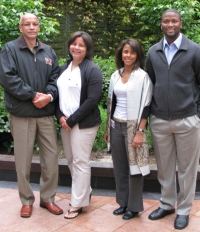
Environmental Assessment Workshop for territories
 (CNS): At an Overseas Countries and Territories Association (OCTA) sponsored workshop last April in Brussels, Belgium, Sustainable Development Coordinator Lisa-Ann Hurlston-McKenzie shared with other Caribbean territories the Cayman Islands’ experience with implementing current EIA procedures, a government release has revealed. Hurlston-McKenzie’s presentation on “The EIA Process in the Draft National Conservation Law of the Cayman Islands”, she explained how the proposed EIA process would essentially codify existing informal arrangements with various approval authorities, and the manner by which triggers – such as locations and project types – would initiate the EIA process.
(CNS): At an Overseas Countries and Territories Association (OCTA) sponsored workshop last April in Brussels, Belgium, Sustainable Development Coordinator Lisa-Ann Hurlston-McKenzie shared with other Caribbean territories the Cayman Islands’ experience with implementing current EIA procedures, a government release has revealed. Hurlston-McKenzie’s presentation on “The EIA Process in the Draft National Conservation Law of the Cayman Islands”, she explained how the proposed EIA process would essentially codify existing informal arrangements with various approval authorities, and the manner by which triggers – such as locations and project types – would initiate the EIA process.
“The two-tiered system would afford better environmental scrutiny of land-based and coastal works applications, plans and policies but would not necessarily result in full EIA studies carried out for all such proposals,” commented Hurlston-McKenzie. “Where full EIAs are not required, the National Conservation Council would recommend conditions of approval for which the authorizing agency (such as Central Planning Authority, Development Control Board or Cabinet) would have to consider when granting final permission under existing approval processes.”
The workshop focused on Environmental Impact Assessments (EIA) and Strategic Environmental Assessments (SEA). These two methodologies describe systems of incorporating environmental considerations into policies, plans and programmes, and the government release says reports which follow the event indicate that shared concerns and solutions should have significant long-term benefits for all involved.
The OCTA is comprised of 17 countries and territories associated with four major European Union (EU) Member states, and incorporates the Caribbean’s Dutch and English-speaking territories. There were 49 conference participants from countries throughout the hemisphere – from Greenland to Bonaire. Their respective environmental and developmental situations were especially relevant in discussions of symbiotic goals and plans.
The Cayman Islands was represented by a four-member contingent of Deputy Chief Officer for the Ministry of Environment Samuel Rose, Planning Director Kenneth Ebanks and DOE representatives Research Officer II Joni Kirkconnell and Hurlston-McKenzie.
Reporting on the Brussels event, OCTA states that some recommendations coming out of it included ‘possibilities for capacity-building and training of OCT officials dealing with EIA/SEA matters’, noting that this would ‘help facilitate sustainable development…and create a framework for incorporating environmental issues within the economic and political decision-making in the OCTs.’ To this end, regular meetings are already being planned.
The organisation further states that it was ‘pleased with the great success due to the high amount of participants and the values of the knowledge and information made available and shared.’
“It is encouraging to know that Cayman is on the right track, generally, and not inconsistent with international practices,” said Rose. From a perspective of local policy development, he reports: “It was always clear that we need improvement in the process of our environmental impact assessments. This is part of Cayman’s Draft Conservation Bill, and it would benefit all stakeholders – developers, the people, and the environment – if the process is clear and consistent with international best-practice. Credible developers are accustomed to transparent and fair EIA processes, with relative timeframes for involvement of government agencies.”
Speaking of the experience of the Brussels conference, Rose acknowledged that there are differences in the application of environmental impact assessments amongst the English, Dutch and French territories. “While there are advantages and disadvantages in each approach, there is no single ‘right way’ and it was useful to develop new perspectives.”
Kirkconnell emphasised this position, stating, “Each country is unique and therefore the process needs to be tailored based on the country’s needs.” She added that having the opportunity to meet and discuss the process with the OCTs helped with this tailoring process, and “provided a better understanding of SEAs and the realization that when it comes to environmental impact assessments, there is no ‘one size fits all’ solution.”
The Director of Planning stated that, “Even though there are major differences between the countries and territories, the workshop reinforced the position that we share some common challenges, and also numerous opportunities. From these we have the ability to create territory-specific communities that improve the quality of life and experiences for all.”
Ebanks noted that networking with participants also increased opportunities for collaboration in areas of technical expertise or “lessons learnt”. “For example, Greenland is going through the planning process for what will probably be the world’s largest aluminum smelting plant. Bonaire is developing a land-use plan.
If Cayman received a similar development application, or experienced a particular impediment with our land use plan, we could consult with those counterparts. We would not have to follow their processes, but could select what is applicable locally.”
Stating that he is looking forward to receiving the revised SEA template so that it can be modified to local use, Ebanks concluded that, “Engaging in the SEA exercise was very useful as this tool could be utilised to predict unanticipated environmental problems as a result of a particular programme, policy or plan.”
Concluding, Policy Analyst in the Cabinet Office Christina Rowlandson clarified that this conference was the third segment of the OCTA Sustainable Development Conference Programme for civil servants in the OCTs.
“The programme, designed to address necessary issues concerning the environment and the challenges of climate change, has also dealt with waste management and water sanitation, as well as sustainable energy policy,” she said. “The conferences will facilitate future policies and actions and enhance networking among public sector leaders.”
The event was funded by the EC Technical Cooperation Facility and supported by leaders of the OCTA Ministerial Conference, in particular OCTA’s Executive Committee, Saint-Pierre et Miquelon, and the Cayman Islands. OCTA and the EC regularly brings professionals from OCTs together at major conferences, at which the networking and presentations facilitate the sharing of information, knowledge and expertise.
Laurens Warnink of the Netherland Antilles is OCTA’s president and chairman of the executive committee. The Cayman Islands chaired OCTA during 2008. The Overseas Countries and Territories Association (OCTA) comprises 17 members: Anguilla, Aruba, British Virgin Islands, Cayman Islands, Falkland Islands, French Polynesia, Greenland, Mayotte, Montserrat, Netherlands Antilles, New Caledonia, Pitcairn, St. Helena and dependencies, St. Pierre and Miquelon, French Southern and Antarctic Territories, Turks and Caicos Islands, and Wallis and Futuna.
Photo: (L-R) Planning Director Kenneth Ebanks, DOE Research Officer II Joni Kirkconnell, DOE Sustainable Development Coordinator Lisa-Ann Hurlston-McKenzie, and Deputy Chief Officer for the Ministry of Environment Samuel Rose.

San Diego divers menaced by jumbo squid
 (BBC): Scuba divers off the Californian city of San Diego are being menaced by large numbers of jumbo squid. The beaked Humboldt squid, which grow up to 5ft (1.5 metres) long, arrived off the city’s shores last week. Divers have reported unnerving encounters with the creatures, which are carnivorous and can be aggressive. One diver described how one of the rust-coloured creatures ripped the buoyancy aid and light from her chest, and grabbed her with its tentacles. "I just kicked like crazy," diver Shanda Magill told the Associated Press news agency. "The first thing you think of is: ‘Oh my gosh, I don’t know if I’m going to survive this.’ If that squid wanted to hurt me, it would have."
(BBC): Scuba divers off the Californian city of San Diego are being menaced by large numbers of jumbo squid. The beaked Humboldt squid, which grow up to 5ft (1.5 metres) long, arrived off the city’s shores last week. Divers have reported unnerving encounters with the creatures, which are carnivorous and can be aggressive. One diver described how one of the rust-coloured creatures ripped the buoyancy aid and light from her chest, and grabbed her with its tentacles. "I just kicked like crazy," diver Shanda Magill told the Associated Press news agency. "The first thing you think of is: ‘Oh my gosh, I don’t know if I’m going to survive this.’ If that squid wanted to hurt me, it would have."
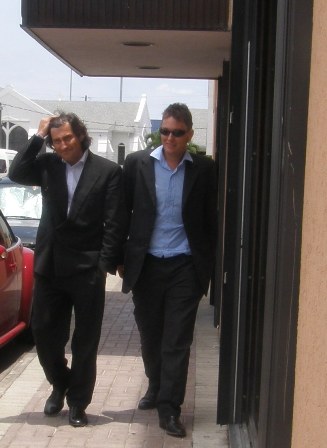
Lawyers sum up their cases
 (CNS): Following the defence’s decision not to call any witnesses on its behalf, both legal teams spent the eighth day of the trial of William Martinez-McLaughlin for murder presenting their closing speeches. Solicitor General Cheryl Richards first put the Crown’s case against McLaughlin, pointing to the testimony of the principal witness, Jason Hinds, and the forensic evidence given by expert witnesses. She was followed by defence lead counsel, Mark Tomassi, who focused on the possibility that the Crown’s case was flipped and that Hinds not McLaughlin was the man who struck the fatal blows to Brian Rankine-Carter. (Left: defence counsel Mark Tomassi and Nick Dixie)
(CNS): Following the defence’s decision not to call any witnesses on its behalf, both legal teams spent the eighth day of the trial of William Martinez-McLaughlin for murder presenting their closing speeches. Solicitor General Cheryl Richards first put the Crown’s case against McLaughlin, pointing to the testimony of the principal witness, Jason Hinds, and the forensic evidence given by expert witnesses. She was followed by defence lead counsel, Mark Tomassi, who focused on the possibility that the Crown’s case was flipped and that Hinds not McLaughlin was the man who struck the fatal blows to Brian Rankine-Carter. (Left: defence counsel Mark Tomassi and Nick Dixie)
The jury heardRichards place the last seven days of evidence in context as she pointed out why the Crown believed Jason Hinds’ testimony and why they believed the forensic evidence also pointed against McLaughlin. She reminded the jury of Hinds’ testimony that McLaughlin was “chopping and chopping” at Rankine and had even had to stop to catch his breath during what Hinds had described as a nightmare. Richards noted how Hinds had taken responsibility for the van from the very start and given a more truthful account of the night when he first encountered the police, implicating himself immediately. Voluntarily showing the police where he had buried his clothes, he had given an account that also found him guilty of the crime of accessory after the fact. She asked the jury, if Hinds was lying why he would not lie to further remove himself from the crime.
With Hinds and McLaughlin both at the scene, she said it was McLaughlin who the Crown believed was the man who committed the murder.
She warned the jury to be careful of the distractions thrown up by the defence and reminded them that suggestions were not evidence. Richards pointed to the forensic evidence placing McLaughlin very “close, closer and closest” to the body at the time Rankine was bleeding, including his boots recovered from bushes in East End and the hat found at the scene which conclusively belonged to him.
The solicitor general noted that most of the blood in the van was on the passenger side where McLaughlin was and that Rankine’s blood on his wallet and belt.
She said that despite the suggestions of the defence, the clothes that Hinds had admitted to burying, which he wore on the night, were not covered in blood and, as the expert witnesses had said, there were some transfer patterns consistent with Hinds’ story that he had made attempts to pull McLaughlin away from Rankine.
Holding up the t-shirt, she asked the jury if it could possibly be the garment worn during the administration of the 48 wounds to Rankine. She asked the jury to think hard and ask what makes sense as she said it was easy to throw mud and for innuendo to take the place of hard facts. Richards conceded that mistakes had been made in the investigation by the police but there was no evidence of collusion or corruption. In the end, when the machete found at Hinds’ house was tested it had no blood on it. She did caution the jury about Hinds’ evidence as she explained that escaping murder charges was a powerful incentive to lie. However, she said if they accepted his evidence then there could be no doubt of McLaughlin’s guilt.
When defence counsel Mark Tomassi took to his feet, he presented another possibility for the jury to consider. He suggested that the roles were reversed and that the police, for whatever reason, had taken Hinds as the innocent man and his client as the murderer when it could have been the other way around. “Why could the case not be looked at the other way around?” he asked.
He reminded the jury that if they were in any doubt at all they must return a not guilty verdict. He pointed to his suggestions of a conspiracy, the missing machete, the conflicting police stories and what he suggested was the special treatment of Hinds. He accused the police of not doing all they could to really investigate Rankine’s murder and said that, while one cannot weight the importance of someone’s life, the police did that.
Whether it was “a cock up or a stitch up”, Tomassi said the results were the same that the police had not investigatedthe case properly.
He said the jury must try the defendant on the evidence and they did not have to come up with their own homespun theory. He said that, while there were many unanswered questions, there would be no more evidence to come. If the jury did not believe Hinds, and he had undoubtedly lied, then they could not find his client guilty, he said. Recounting what had allegedly happened, he suggested to the jury that it must be obvious it was all about drugs and that Hinds had lied about his drug use.
Tomassi said the presence at the scene of the crime was not enough to convict McLaughlin, as both men had gone to the car park in McField Lane and both men had got out of the van. The presence of blood on McLaughlin’s shoes was not enough as it was impossible to say how much blood was on Hinds’ shoes as he had cleaned them. he said.
Tomassi told the jury that he believed the evidence pointed the other way round, but without the resource such as those available to the RCIPS, he and Nick Dixie, his junior counsel, could not prove it. He said that once the jury found that they could not believe Hinds against a backdrop of misadventure, incompetence or worse, they could not find his client guilty.
Justice Alex Henderson adjourned the case until Monday morning, when he will offer his directions to them before they begin their deliberations, he told the jury.

Police fail to tape interviews
 (CNS): According to information revealed during the recent Grand Court murder trial, there are as few as five officers who are trained to tape record interviews with witnesses in the RCIPS and most of them work in the Financial Crimes Unit. Routinely, all interviews conducted during police investigations, even those in the case of the most serious crimes, are hand written. The revelation came from Detective Sergeant Joseph Wright, who, when asked by defence counsel why he had not recorded his private meeting with the Crown’s principal witness, said that he was not trained to do taped interviews.
(CNS): According to information revealed during the recent Grand Court murder trial, there are as few as five officers who are trained to tape record interviews with witnesses in the RCIPS and most of them work in the Financial Crimes Unit. Routinely, all interviews conducted during police investigations, even those in the case of the most serious crimes, are hand written. The revelation came from Detective Sergeant Joseph Wright, who, when asked by defence counsel why he had not recorded his private meeting with the Crown’s principal witness, said that he was not trained to do taped interviews.
“There are less than five persons in the RCIPS that are trained to do that and I am not one of them,” he told the court this week. The problem was confirmed by Chief Inspector Peter Kennett, who said that while the policy had been established and he had been trying for several years to introduce tape recording, the pressures on the Criminal investigation Department had made it impossible for him to organisae the training.
“We have agreed the policy but we have not been able to the do the training,” he lamented. “The training, which is a two-day session, has been booked for times over the last year, and every time we have been forced to cancel it because of murder cases.”
Kennett explained that the two-day course includes interview techniques and it is not just a matter of placing a tape in a recorder but the specific procedures that have to be followed. Kennett said that he routinely records his own interviews as he is trained to do so and that there were other officers attached to the FCU that were also trained. He confirmed, however, in the meantime officers not trained to tape interviews record them by hand and use contemporaneous notes.